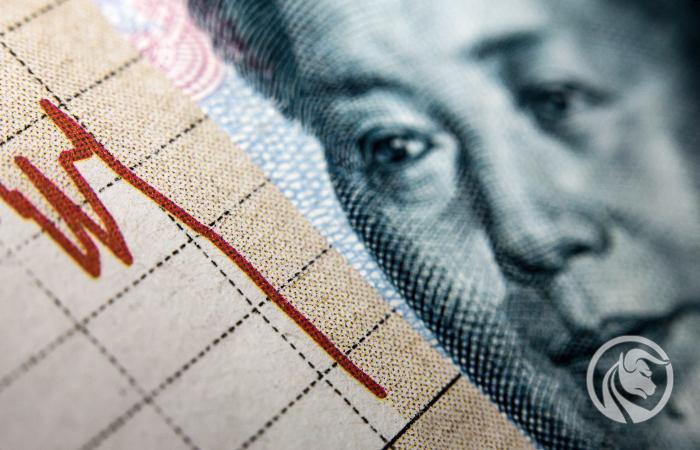The slowdown in China is causing concern around the world
China's economy was expected to drive one-third of global economic growth this year, so its dramatic slowdown in recent months is causing alarm around the world. Policymakers are bracing for a hit to their economy as imports into China decline in everything from construction materials to electronics.
Caterpillar Inc. says Chinese demand for machinery used on construction sites is worse than previously thought. US President Joe Biden called out China's economic problems "a ticking time bomb".
Foreign capital is flowing out of Chinese stock exchanges
Global investors have already withdrawn more than $10 billion from China's stock exchanges, most of which were sold in blue chips. Goldman Sachs and Morgan Stanley lowered their targets for Chinese stocks, with the former also warning of the risk of spillover to the rest of the region.
Asian economies, like African countries, are suffering the worst trade losses by far. In July Japan recorded its first decline in exports in more than two years as China curbed purchases of cars and chips. Central bankers in South Korea and Thailand last week cited China's weak recovery and lowered their growth forecasts.
But that's not all. A slowdown in China will cause global oil prices to fall, and deflation in that country means falling prices for goods shipped around the world. This is a benefit for countries like the US and UK that still struggle with high inflation.
Some emerging markets, such as India, are also seeing opportunities, hoping to attract foreign investment that may leave China's shores.
But as the world's second-largest economy, a prolonged slowdown in China will hurt rather than help the rest of the world. Analysis by International Monetary Fund shows how high the stakes are: when China's growth rate increases by 1 percentage point, global expansion will be increased by about 0,3 percentage points.
Deflation in China is not such a bad thing for the world economy, but if the rest of the world, the US and Europe, fall into recession, if China remains weak, it will be a problem - not only for China, but for the entire world economy.
Here's how the slowdown in China is affecting economies and financial markets:
Trade collapse
Many countries, especially Asian ones, count China as their biggest export market for everything from electronic parts and food to metals and energy.
The value of Chinese imports has fallen for nine of the last 10 months as demand has fallen from record levels set during the pandemic. The value of exports from Africa, Asia and North America was lower in July than a year ago.
Africa and Asia were the hardest hit, with the value of imports falling by more than 14% in the first seven months of this year. This is partly due to declining demand for electronic parts from South Korea and Taiwan, while falling prices for commodities such as fossil fuels are also weighing on the value of goods shipped to China.
So far, the actual volume of commodities such as iron ore and copper shipped to China has remained steady. However, if the slowdown continues, supplies could be impacted, which in turn would affect miners in Australia, South America and other parts of the world.
Deflationary pressure
Producer prices in China have been falling for 10 months, which means the costs of goods shipped from the country are falling. This is good news for people around the world still struggling with high inflation.
Prices for Chinese goods at U.S. docks have been falling every month this year, and that trend is likely to continue until factory prices in China return to positive territory.
Economists at Wells Fargo estimate that "hard landing" in China – which they define as a 12,5% deviation from the growth trend – would reduce the baseline forecast of US consumer inflation in 2025 by 0,7 percentage points to 1,4%.
Slow rebound in tourism
Chinese consumers spend more on services such as travel and tourism than on goods, but they are not yet going abroad in large numbers. Until recently, the government has banned group trips to many countries and there is still a shortage of flights, which means that traveling is much more expensive than before the pandemic.
The pandemic and a weak economy have squeezed incomes in China, and a years-long housing crisis means homeowners feel less affluent than before. This suggests that overseas travel may take a long time to return to pre-pandemic levels, hitting tourism-dependent Southeast Asian countries such as Thailand.
Currency impact
China's economic woes have caused the currency to fall more than 5% against the dollar this year, with the yuan on the verge of breaching 7,3 this month. The central bank has stepped up its defense of the yuan through various measures, including daily currency fixings.
Bloomberg data shows that the depreciation of the overseas yuan is having a greater impact on its counterparts in Asia, Latin America and the Central and Eastern European bloc, with the Chinese currency increasing in correlation with some other currencies.
According to Barclays bank, as correlations increase, deterioration in sentiment may weigh on currencies such as the Singapore dollar, Thai baht and Mexican peso.
The Australian dollar, which is often priced as a proxy for China, lost more than 3% this quarter, the worst performance in the G10 basket.
Bonds lose their attractiveness
This year's interest rate cuts in China have reduced the attractiveness of Chinese bonds for foreign investors, who have limited their exposure to the market and are looking for alternatives in the rest of the region.
According to the calculations Bloomberg overseas portfolios of Chinese government bonds have had the lowest share in the entire market since 2019. Global funds have become more bullish on local currency bonds in South Korea and Indonesia as their central banks near the end of their interest rate hike cycle.
Stock market and companies from the luxury goods industry
An MSCI index tracking global companies with the most exposure to China has fallen 9,3% this month, almost twice as much as a broader gauge of global shares.
It is also worth noting that they are particularly susceptible to fluctuations in Chinese demand luxury goods companies, such as handbag maker Louis Vuitton LVMH, Gucci Kering SA and Hermes International.






















![Forex Club – Tax 9 – Settle tax on a foreign broker [Download the Application] Forex Club - Tax 9](https://forexclub.pl/wp-content/uploads/2024/02/Forex-Club-Podatek-9-184x120.jpg?v=1709046278)
![Trading View platform – solutions tailored to the needs of traders [Review] trading view review](https://forexclub.pl/wp-content/uploads/2024/03/trading-view-recenzja-184x120.jpg?v=1709558918)
![How to connect your FP Markets account to the Trading View platform [Guide] fp markets trading view](https://forexclub.pl/wp-content/uploads/2024/02/fp-markets-trading-view-184x120.jpg?v=1708677291)
![CRB index – one of the popular commodity market benchmarks [Guide] crb index](https://forexclub.pl/wp-content/uploads/2024/05/indeks-crb-184x120.jpg?v=1715055656)
![How to invest in ChatGPT and AI? Stocks and ETFs [Guide] how to invest in chatgpt and artificial intelligence](https://forexclub.pl/wp-content/uploads/2023/02/jak-inwestowac-w-chatgpt-i-sztuczna-inteligencje-184x120.jpg?v=1676364263)






![Izabela Górecka – “Success on the market depends not only on knowledge, but also on emotional stability” [Interview] Izabela Górecka - interview](https://forexclub.pl/wp-content/uploads/2024/04/Izabela-Gorecka-wywiad-184x120.jpg?v=1713870578)
![WeWork – the anatomy of the collapse of a company valued at $47 billion [WeWork, part II] wework bankruptcy story](https://forexclub.pl/wp-content/uploads/2024/04/wework-bankructwo-historia-184x120.jpg?v=1711729561)
![Adam Neumann – the man who screwed up Softbank [WeWork, part AND] adam neumann wework](https://forexclub.pl/wp-content/uploads/2024/04/adam-neumann-wework-184x120.jpg?v=1711728724)

![The most common mistakes of a beginner trader - Mr Yogi [VIDEO] Scalping - The most common mistakes of a beginner trader - VIDEO](https://forexclub.pl/wp-content/uploads/2024/03/Scalping-Najczestsze-bledy-poczatkujacego-tradera-VIDEO-184x120.jpg?v=1711601376)
![Learning patience: No position is also a position - Mr Yogi [VIDEO] Scalping - Learning patience - No position is also a position - VIDEO](https://forexclub.pl/wp-content/uploads/2024/03/Scalping-Nauka-cierpliwosci-Brak-pozycji-to-tez-pozycja-VIDEO-184x120.jpg?v=1710999249)
![When to exit a position and how to minimize losses - Mr Yogi [VIDEO] Scalping - When to exit a position and how to minimize losses - VIDEO](https://forexclub.pl/wp-content/uploads/2024/03/Scalping-Kiedy-wyjsc-z-pozycji-i-jak-minimalizowac-straty-VIDEO-184x120.jpg?v=1710336731)


















